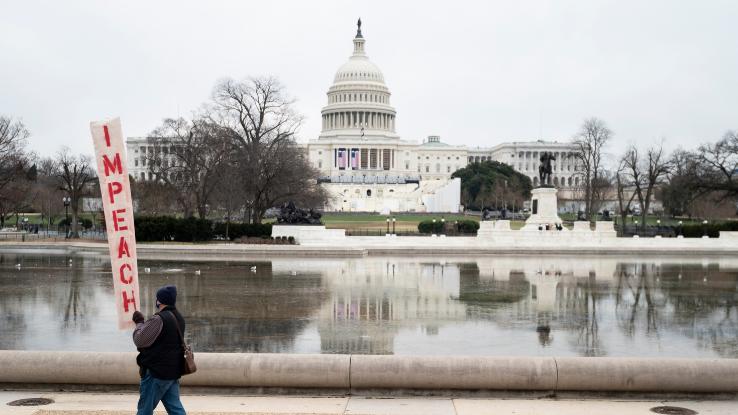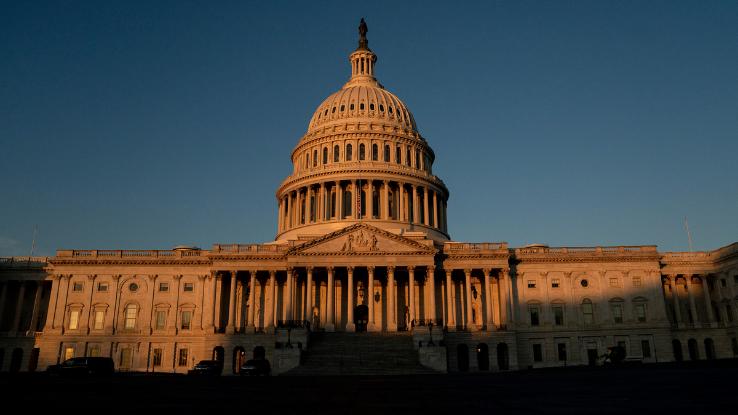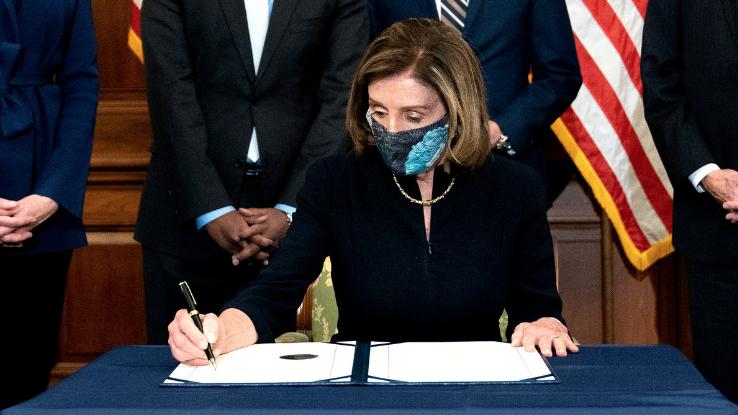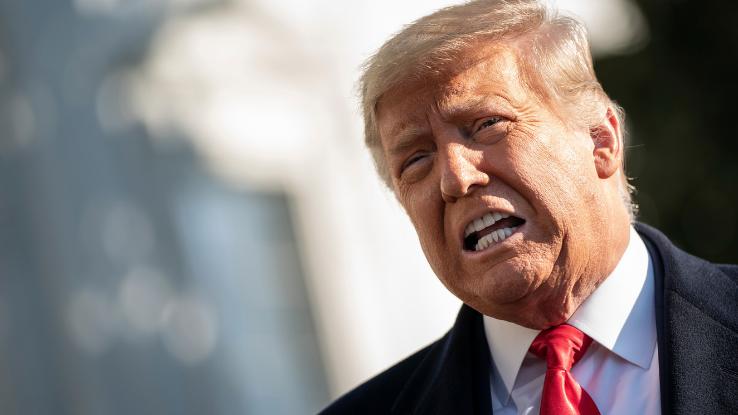Can a President Be Elected Again After Being Impeached

On January xiii, 2021, the Business firm gathered to vote on the impeachment of Donald Trump on the grounds of coup against the Us. The movement to impeach came in the wake of the January 6 white supremacist attack on the U.Due south. Capitol — an attack the so-president incited, encouraging supporters to end the official certification of the presidential election results. With a bulk of House members voting in the affirmative, Trump became the starting time president in U.S. history to be impeached twice.
Fast forward to February 9, 2021, which marked the start of Trump's 2nd impeachment trial. With Trump out of office, many were confused every bit to why lawmakers and American citizens wanted the impeachment process to continue. Ultimately, the procedure ended with Trump's acquittal on February 13, but the case did reiterate how important it is to look toward both the past and the future in gild to contextualize the present moment. So, permit's take a look at the history of impeachment in the U.S. and how it applied to the unprecedented events of 2021.
How Does the Impeachment Procedure Work?
Article Ii, Department Iv of the Constitution states that "The President, Vice President and all civil Officers of the United states of america, shall be removed from Role on Impeachment for, and Conviction of, Treason, Bribery, or other loftier Crimes and Misdemeanors." That is to say, the Constitution grants Congress the authority to impeach and remove the president from office. Although the process has multiple steps, it tin can exist cleaved downward into ii main stages: impeachment, which is determined by the House, and confidence, which is determined by the Senate.

So how does the procedure start? Afterwards a president has committed an act that may violate their adjuration of office and/or be deemed an impeachable offense, as stated above, any member of the House of Representatives can innovate an impeachment resolution — or, equally a whole, the Firm tin can initiate the impeachment procedure by passing a resolution. It should be noted that only the U.S. House of Representatives tin can impeach a sitting U.South. president and, in order to do and so, the House must hold a majority vote on i or more than of the manufactures of impeachment. In essence, the House is tasked with investigating whether or non there are sufficient grounds to impeach the official in question. But the seemingly straightforward process has quite a few steps.
After impeachment is introduced, the real process begins. In the House of Representatives, the House Judiciary Commission decides whether or not impeachment should proceed. If they resolve to motion forwards, the Chairman of the Committee proposes a resolution calling for a formal research into the issue of impeachment. Once that enquiry is consummate, a resolution is sent to the whole House declaring whether impeachment is warranted or not. The whole Firm then debates the matter and votes on each article of impeachment; if any one of the manufactures is approved by a majority vote, the official in question is considered impeached. All the same, this is merely a way of charging the official with a crime.
From at that place, the procedure — and the articles of impeachment — moves to the Senate, where the impeachment trial is held. During the trial, various members of the House serve equally prosecutors, while the impeached defendant is represented by a lawyer. Additionally, the Primary Justice of the Supreme Court presides over the proceedings while the members of the Senate human action as a jury. After the House prosecutors present evidence of impeachable offenses, the Senate debates until a verdict is reached — and that verdict requires a ii-thirds vote for a confidence. If the Senate convicts the official in question, they tin can then hold separate votes to remove the official from office and bar them from holding federal offices in the time to come.
Before Donald Trump, only three presidents ever faced impeachment. In 1974, the House Judiciary Committee voted on the articles of impeachment for Richard Nixon, but, before the full House came to any decisions, Nixon resigned, thus evading a formal impeachment status. Still, both Andrew Johnson and Neb Clinton were formally impeached — though they were also both acquitted in trials held past the Senate.

On Feb 24, 1868, Johnson was impeached after violating the Tenure of Office Act; he dismissed his Secretary of War from part and replaced him without Senate blessing. Well over a century later, Clinton was impeached on December 19, 1998 for charges of perjury and obstacle of justice related to what has since been dubbed the Clinton–Lewinsky scandal.
On December 18, 2019, Trump joined Johnson and Clinton's ranks, becoming the third president to be impeached in U.S. history. The House alleged that Trump abused his ability by soliciting foreign interference in gild to assist his re-election bid — then went on to obstruct Congress and the impeachment process. Similar his predecessors, Trump was acquitted.
Why Did Lawmakers Move Forward with Trump's Second Impeachment Trial?
On Jan vi, 2021, Trump's supporters attacked the Capitol. Five people died as a outcome of their seditious, tearing actions. Video footage surfaced of these insurrectionists assaulting police force officers, further underscoring that their "blue lives affair" rallying cry was never really nearly anything other than upholding white supremacy. Lawmakers — and their staff and visiting family members — were escorted to an alleged secure location, but many all the same feared for their lives. And, for the first time, the Amalgamated flag, an indisputable symbol of white supremacy and sedition, hung from the Capitol, which is something, as Representative Alexandria Ocasio-Cortez (Dem-NY) pointed out, that didn't even occur during the American Ceremonious War.

When it became credible that Vice President Mike Pence was not going to invoke Section 4 of the 24th Amendment, lawmakers on both sides of the aisle called for a second impeachment of Donald Trump. After the deadly attack on the Capitol, lawmakers felt passionately well-nigh responding with strength — after all, what happens in the wake of the insurrection will set a precedent non merely for years just decades to come. Politico noted that Speaker Nancy Pelosi (Dem-CA) "views the invasion of the Capitol as more than only an attempt to overturn the results of the presidential election by a pro-Trump mob." The insurrectionists targeted lawmakers — those who represent the people — and attacked the very seat of democracy.
"To allow the President of the United States to incite this attack without consequence is a direct threat to the hereafter of our commonwealth," Representative John Katko (Rep-NY) tweeted. "For that reason, I cannot sit down idly by without taking activity. I will vote to impeach this President." In total, nine Republicans in the Firm joined Democrats in voting for Trump's impeachment on January 13, 2021. CNN dubbed information technology "a swift bipartisan condemnation" — and ane that officially fabricated Trump the first president in U.S. history to exist impeached twice.
What Would Trump Have Lost If He Had Been Convicted?
The day of the impeachment verdict — January 13 — was just days abroad from President Joe Biden's inauguration. At the time, some wondered why impeaching Trump, who had just seven days left in his term, was and so essential. Even as the trial started in February 2021, some Americans wondered if moving forward with the impeachment of a former president was the right course of action.

For folks like Representative Katko and Senator Bernie Sanders (Dem-VT), the reasons to move forward could be summed up with one discussion: precedent. Trump was impeached for incitement of insurrection, something that came as a upshot of his refusal to accept (and desire to overturn) the 2020 presidential election results. "It must exist fabricated articulate that no president, now or in the future, can lead an insurrection against the U.Due south. government," Sanders tweeted days after the assault on the Capitol.
In add-on to not wanting other (or future) seditionists to feel emboldened, proponents of Trump'south 2d impeachment believed it would open up the door to him losing his mail service-presidency benefits — and they'd be correct. However, since his trial occurred after he was out of role, those ramifications would've looked a chip different.
"The Former Presidents Deed provides ex-presidents with a number of benefits, including a $200k annual pension, a travel allowance, lifetime Secret Service item, and more," James Curry, Associate Professor of Political Science at the University of Utah, told ABC4. Back-scratch notes that Trump "would [have lost] the pension and other monetary benefits, just non the Secret Service protection" if he had been removed from office before January twenty. While Trump retained those monetary benefits, other privileges were still on the line. If he had been convicted, the Senate could have and then voted to bar him from running for part in the future.
jefferiescanch1939.blogspot.com
Source: https://www.reference.com/world-view/steps-presidential-impeachment?utm_content=params%3Ao%3D740005%26ad%3DdirN%26qo%3DserpIndex
0 Response to "Can a President Be Elected Again After Being Impeached"
Post a Comment